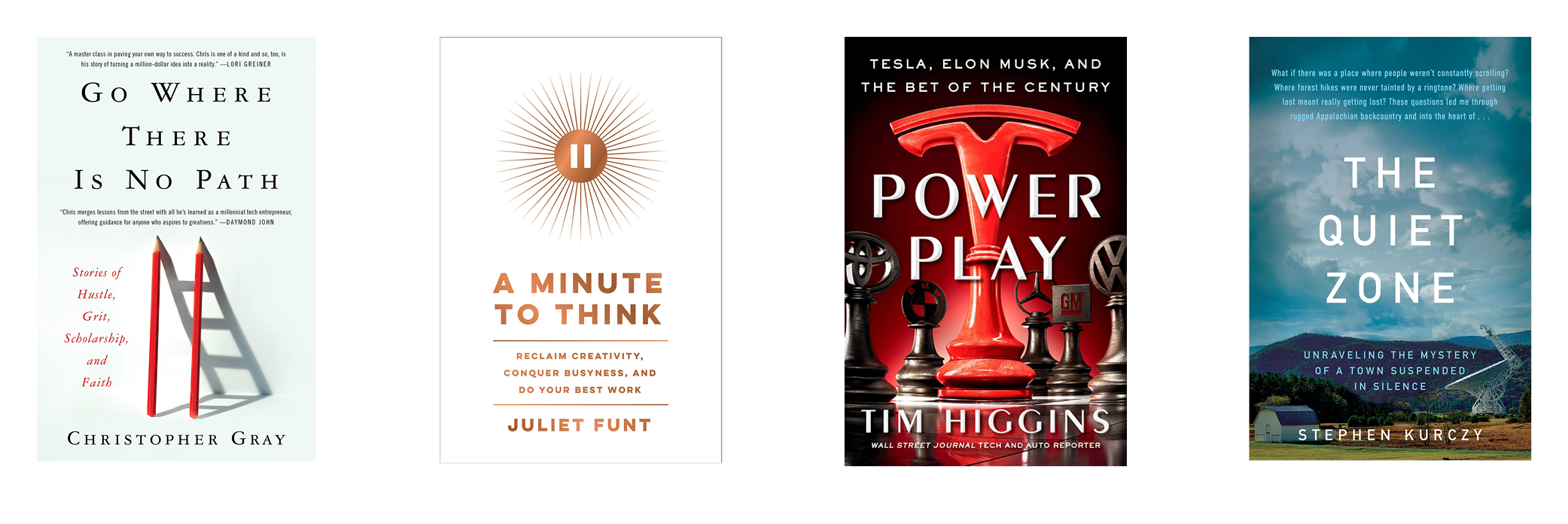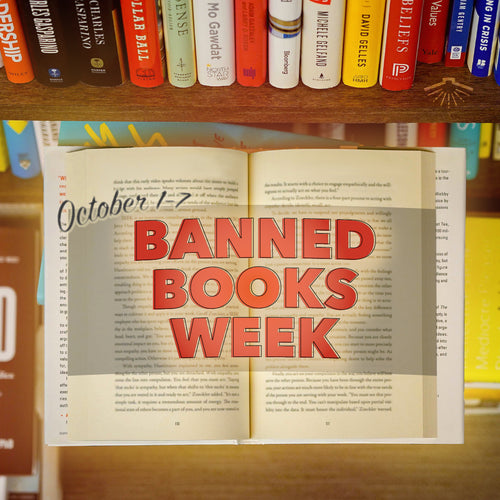Books to Watch | August 3, 2021
Each and every week, our marketing team—Dylan Schleicher (DJJS), Gabbi Cisneros (GMC), and now Emily Porter (EPP)—highlights a few new books we are most excited about.
This week, our choices are:

Go Where There Is No Path: Stories of Hustle, Grit, Scholarship, and Faith by Christopher Gray and Mim Eichler Rivas, William Morrow
The paths from poverty to CEO leadership are always interesting to trace, because while the trajectories are unique, the indicators of strong entrepreneurship are analogous, and the uplifting nature of their stories never gets old. The memoirs of Howard Schultz of Starbucks, Ursula Burns of Xerox, Chris Gardner of Gardner Rich & Co. and now Christopher Gray of Scholly are just a few "rags to riches" business memoirs you should know about. In Go Where There Is No Path, Christopher Gray calls out several societal beliefs that are inhibiting all of us, individually and collectively, from improving our lives. He wants people to see an outsider's success as earned, not a fluke, and for entrepreneurs to know that for-profit companies, just as well as non-profits, can be good companies that offer solutions to social issues.
Go Where There is No Path offers practical advice to networking to help achieve your and your business's goals, brand building, evaluating and improving your business model, and most importantly shows that success doesn't have to come at the cost of rejecting your values or yourself. (GMC)
A Minute to Think: Reclaim Creativity, Conquer Busyness, and Do Your Best Work by Juliet Funt, Harper Business
Overwork is glorified in our culture, but it is undermining our overall performance. The most influential CEOs and sports stars, when explaining their success in interviews, often talk about how they simply outworked their competitors. What we don’t hear about as much is the need for rest and recovery, and for reflection. And what we’re hearing about much more lately is the mental health toll that such pressure and overwork can cause. We need the ability to step back, to think, reflect, envision, plan, and strategize. To be at our best, we must carve out time to take a strategic pause, whether that means finding open windows of time in our daily routines to do nothing but pay attention to and follow our thoughts, taking a moment in between receiving information and reacting to it, or taking time off to reset. As Juliet Funt writes:
When people are freed from the antiquated notion that unfilled time is the enemy, they discover that taking a minute to think is a formidable source of professional power.
She compares the space we need to give ourselves to the space a fire needs to burn, and insists that in our overscheduled, overworked environments, “There’s no oxygen to feed the fire.” Rich in such analogies and insight, while addressing both our personal and professional lives, Funt helps us find a starting point to end the busywork that extinguishes the flame of creativity in our lives and organizations. “We begin by striking a single claim: Thinking is time well spent.” (DJJS)
Read the full review here. And this week, enter to win a copy!
Power Play: Tesla, Elon Musk, and the Bet of the Century by Tim Higgins, Doubleday
Elon Musk has become synonymous with Tesla, so I was surprised to find out that he was not one of the company’s original co-founders when the company launched. It was started by Martin Eberhard and Marc Tarpenning in 2003. Musk joined Tesla as its primary investor and chairman of the board of directors in 2004 and gained control of it through various rounds of funding in the years following. He gained the title of co-founder only in 2009, six years after the company was incorporated, in a lawsuit settlement between Tesla and one of its original founders, Eberhard.
Still, as the public face of Tesla, Elon Musk has become synonymous with not only the company, but with the very idea of a commercially viable electric car. Tim Higgins’s Power Play makes clear that, with the advances in lithium-ion batteries, the electric car’s time had come with or without Musk, and it was an all-out effort he joined rather than created. Power Play is a fascinating book in large part because Elon Musk is a fascinating—if sometimes infuriating—figure. But I couldn’t help wondering, while reading the book, what the story would have been like had Musk not dominated it so thoroughly. Perhaps the company wouldn’t have survived to write a story about. Without his PR wizardry, it likely wouldn’t have gained the status as the world’s most valuable automaker (on paper) to make him the world’s richest person (again, on paper). And maybe it would have just become a somewhat quieter, less controversial, but still thoroughly paradigm-shifting company. In the end, I’m also left wondering if maybe the company survives today in large part despite him. But the true story of Tesla is not one of a lone genius as much as it is a cast of characters combining their talents, advances in technology, and their collective vision to create a company and a car they thought could change the world. (DJJS)
The Quiet Zone: Unraveling the Mystery of a Small Town Suspended in Silence by Stephen Kurczy, Dey Street Books
Green Bank, West Virginia is known for being a “quiet zone” in America, home of the Green Bank Observatory, where scientists study the universe (and extraterrestrials!) with the latest technology. Residents of this small town go without digital access or any devices emanating radio waves that would interfere with the observatory’s research. Stephen Kurczy, a journalist who ventures to this small town looking for some silence of his own, finds a reality that is rarely known in today’s modern world: A place where time seems to be a decade behind and people still invite you over for dinner.
An interesting look into a small town disconnected from the digital world and questioning what the government might actually be doing in our backyards, Kurczy provides insight into what it means to disconnect, what the government might be planning in the lieu of disaster and how to appreciate a conversation with a stranger without looking for a screen. (EPP)



